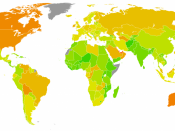The threat of global warming caused by the overuse of greenhouse gases and consequently the depletion of the ozone layer have caused for the introduction of the Kyoto Agreement, an agreement made by the governments of 55 developed nations at the United Nations Climate Change Convention in Japan 1997, to reduce worldwide greenhouse gas emissions by approximately 5% by the year 2012. For Australia to meet such regulations, the nation's greenhouse gas emissions must be reduced by 8%. Since 1997, Australian society has had many differing views on whether we as a nation should attempt to comply with the regulations of the Kyoto Agreement. Although this reduction in greenhouse gas emissions would somewhat reduce the present damage of the depletion of the ozone layer, manufacturers are concerned that the reductions will obstruct the economic growth of many businesses and industries in Australia. It is at this point that the people of Australia must decide that whether signing the Kyoto Agreement is economical for our country, or beneficial for other nations of the world.
Of particular concern is the increase of carbon dioxide emissions being released into the atmosphere as a result of industry, production and fossil fuel combustion. As a result, global warming is occurring which will cause an increase in climate warming and in turn will have harmful effects on both human and ecological environments.
Primarily, Australia will not sign the Kyoto Agreement as the United States, the world's largest producer of greenhouse gases, have yet to sign and approve the motion. However it is also argued that many jobs will be lost in the coal mining industry, with coal being Australia's largest export and great supplier of income to the country. If Australia were to sign the Kyoto Agreement, it would be forced to reduce...


